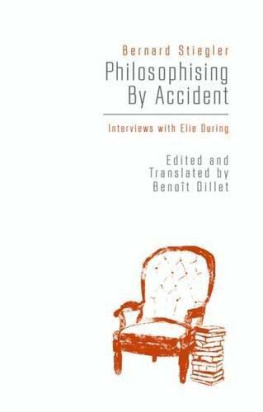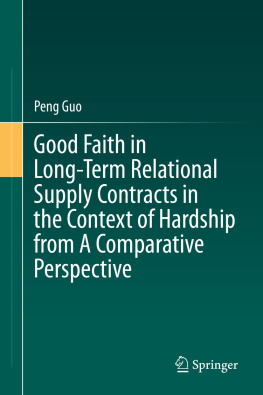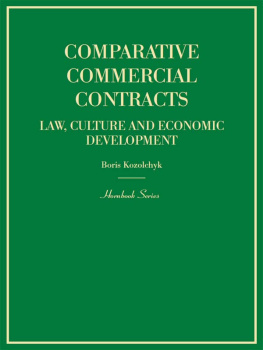Philosophising by Accident
Philosophising by Accident
Interviews with lie During
Bernard Stiegler
Edited and Translated by Benot Dillet

Edinburgh University Press is one of the leading university presses in the UK. We publish academic books and journals in our selected subject areas across the humanities and social sciences, combining cutting-edge scholarship with high editorial and production values to produce academic works of lasting importance. For more information visit our website: edinburghuniversitypress.com
Philosopher par accident: Entretiens avec lie During, Bernard Stiegler, 2004
English translation Benot Dillet, 2017
Edinburgh University Press Ltd
The Tun Holyrood Road, 12(2f) Jacksons Entry, Edinburgh EH8 8PJ
A CIP record for this book is available from the British Library
ISBN 978 1 4744 0825 7
The right of Bernard Stiegler to be identified as the author of this work has been asserted in accordance with the Copyright, Designs and Patents Act 1988, and the Copyright and Related Rights Regulations 2003 (SI No. 2498).
Published with the support of the University of Edinburgh Scholarly Publishing Initiatives Fund.
Contents
Notes on the English Translation
The set of radio interviews that compose this book do not pose a lot of problems for the translator since Bernard Stiegler purposefully used a plain language to make his philosophical ideas available to a larger audience. However, I did have to simplify some sentences, or split them, to make them more fluent in English. Stieglers language is quite logical as it moves by blocks; each concept or neologism refers to a specific philosopher or period in his thought, making it easy for the reader to witness the development of his thought.
I avoided adding too many endnotes to clarify specific points but I would like to draw the attention of readers to the translation of specific words or expressions that could help in understanding the text. Following Christopher Johnson, I have used externalisation for extriorisation since external is commonly used in English and not in French, and it also flows much better. I have translated esprit as spirit but it should also be understood as mind in the English sense, related to the intellect and cognition. For Stiegler, esprit is larger than the domain of the understanding (in Kantian terms), and his use of the term is a conscious move to reintroduce older questions, to relate his own work to other, older, traditions in philosophy. This move is aligned with that in Derridas book on the concept of spirit/mind in Heidegger.). He implicitly calls for a deeper understanding that takes into consideration the unconscious but it is also a call to take responsibility. Unawareness is insufficient and perhaps even misleading since he explicitly rejects the Marxist conception of awareness. In this sense there is no awareness or consciousness that could save one from this condition of inconscience. I have also marked out words in English in the original with italics and with a star (*).
Finally, I would like to thank Bernard and Caroline Stiegler for their help and trust, Carol Macdonald for agreeing straight away to publish this translation with Edinburgh University Press, the two anonymous reviewers for their comments and corrections, Gerald Moore for the initial support, Anas Nony for her suggestions and the camaraderie, and Julia Elsky for her interest and for reading early drafts. Finally, shukriya Tara for helping me immensely throughout, especially in the final editing stages.
Jacques Derrida, Of Spirit: Heidegger and the Question, trans. Geoffrey Bennington and Rachel Bowlby (Chicago: University of Chicago Press, 1991).
Translators Introduction: Radiographing Philosophy
This series of interviews between Bernard Stiegler and lie During was first broadcast in 2002 on France Culture, a renowned French public radio station that serves as a platform for academics and non-academics (cultural journalists) to discuss at length extremely diverse topics: from the most recent political news to the most esoteric and specialised topics. lie During, who was writing a PhD dissertation on Bergson and Einstein at that time at the University of Paris 10 Ouest Nanterre, was fascinated with the speculative ambition of Stiegler and the breadth of his philosophical project and felt in the position of a participant observer during these interviews, to use the ethnographic expression. As Stiegler notes in the 2014 interview for this English edition, this second period worked at producing a new critique of political economy for the digital age. This new critique of political economy and his elements for an aesthetic theory developed in the Symbolic Misery series (20045) are directly derived from his fundamental thesis about tertiary retention (or third memory). While putting on hold the project of Technics and Time, he continued to draw from his working hypothesis and wrote his deconstruction of philosophy from the point of view of technics but in relation to contemporary political, economic and cultural events.
Radiographing Philosophy
Philosophising by accident is both the expression that best defines Stieglers own approach in philosophy and the philosophical practice on radio in general. Undoubtedly, relations between philosophy and radio have a long history in the twentieth century, both in France and in other countries; depending on the traditions, philosophers have invested in or resisted the pedagogical and political possibilities of the medium. The intentions of radiographing philosophy differ from those of writing books of philosophy. The transmission of philosophical debates and discourse on the radio waves hopes to reach audiences beyond the lecture theatres and the library lovers. Radio delocalizes philosophy from within by seeking the accidental listener who will synchronise for a moment his or her own time to the radio programme and the ideas at stake.
As the cultural theorist John Mowitt notes, radio was a problem discussed widely in different philosophical traditions in particular by Martin Heidegger, Theodor Adorno, Walter Benjamin, Bertolt Brecht, Georg Lukcs and Jean-Paul Sartre. While it was an object of philosophical reflection, the cultural studies of radio were quickly devalued in the twentieth century, eclipsed by television and cinema studies.
In the case of philosophy in the French language, France Culture has a singular role to play in instituting philosophy as a living discipline. First created in 1963, France Culture as a radio station has produced a parallel space or institution, and woven contiguous relations with the virtual space of readers. There is a maieutic process at work between the flow of philosophical radio programme and the flow of the listeners consciousness. Listening is not passive but an active selection of elements from the point of view of psycho-collective memories and expectations. The listener is thus always potentially a reader as well as a speaker or a writer of philosophy; he or she can act out this potential from the radiographical impulse.
In evaluating the significance of this book by Stiegler in his larger corpus, one needs to take into consideration the institutive and constitutive significance of France Culture for French philosophy as an academic discipline and a form of thought. France Culture is defined as a supply-based radio,EHESS and ENS amongst others). France Culture also differs from the pedagogical model of Radio-Sorbonne, created in 1947 as a proto-MOOC that broadcast in Paris university lectures from the Sorbonne.













